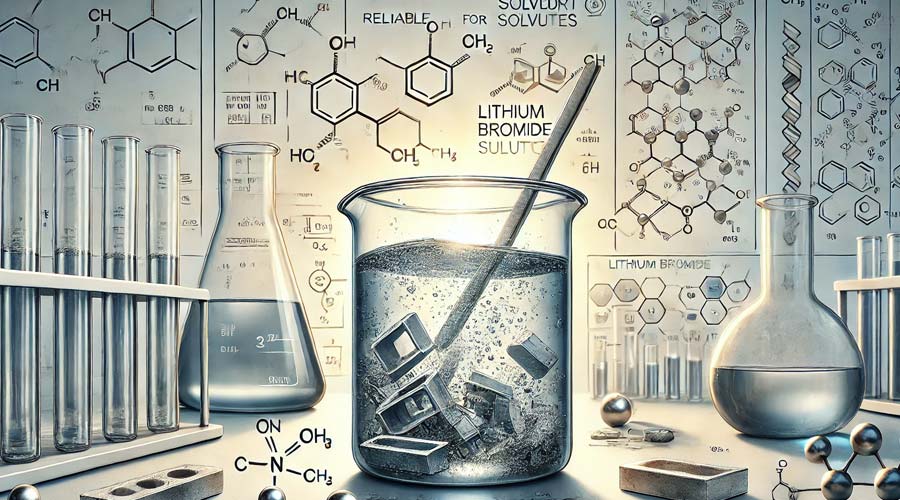In the field of materials science and engineering, understanding the mechanisms of corrosion is crucial for developing materials that can withstand harsh environments. Lithium bromide (LiBr) solution has emerged as an effective solvent for corrosion studies, offering unique properties that make it ideal for investigating the behavior of metals and alloys under corrosive conditions. This article explores the role of lithium bromide solution in corrosion research, highlighting its advantages and applications in advancing the science of material durability.
Table of Contents
1. The Importance of Corrosion Studies
Corrosion is a natural process that leads to the deterioration of metals and alloys due to chemical reactions with their environment. From infrastructure to industrial machinery, corrosion can have costly and potentially dangerous consequences. As such, corrosion studies are vital for understanding how different materials interact with their environment and for developing strategies to prevent or mitigate corrosion.
Key Goals of Corrosion Studies:
- Evaluate Material Resistance: Determine how various metals and alloys perform under corrosive conditions.
- Identify Corrosion Mechanisms: Understand the chemical processes that lead to material degradation.
- Develop Protective Measures: Create coatings, inhibitors, or materials that resist corrosion effectively.
2. The Role of Lithium Bromide Solution in Corrosion Studies
Lithium bromide solution is widely used in corrosion studies due to its ability to simulate harsh environments. As a hygroscopic salt, LiBr is particularly effective at attracting and retaining moisture, which is a critical factor in many types of corrosion. By using lithium bromide solution as a solvent, researchers can replicate the conditions that lead to corrosion in various industrial applications, such as HVAC systems, chemical processing plants, and marine environments.
Why Lithium Bromide Solution?
- Moisture Absorption: The hygroscopic nature of LiBr allows it to create environments with high humidity, a common factor in corrosion.
- Controlled Corrosive Conditions: LiBr solution enables precise control over the concentration and composition of the corrosive medium, allowing for detailed studies.
- Stability and Consistency: The solution remains stable over a wide range of temperatures, ensuring consistent results during prolonged studies.
3. Applications of Lithium Bromide in Corrosion Research
Lithium bromide solution is used in a variety of corrosion research applications, particularly those involving metals and alloys that are exposed to humid or saline environments.
Applications Include:
- Metals in HVAC Systems: Lithium bromide is commonly used in absorption chillers and other HVAC systems. Corrosion studies using LiBr solution help assess the long-term durability of metals like copper and aluminum in these systems.
- Marine and Coastal Structures: The solution is used to simulate the corrosive effects of seawater and salt spray on materials used in marine environments, such as stainless steel and titanium.
- Chemical Processing Equipment: Corrosion studies with LiBr solution help evaluate the resistance of metals and alloys used in chemical processing plants, where exposure to corrosive chemicals is common.
For more insights into our lithium bromide products, visit our Lithium Bromide Products page.
4. Advantages of Using Lithium Bromide Solution for Corrosion Studies
Several factors make lithium bromide solution an ideal choice for corrosion studies:
- Precision in Simulating Environments: The solution’s ability to replicate specific corrosive environments allows for accurate testing and evaluation.
- Versatility: Lithium bromide solution can be used to study a wide range of materials, from common metals to specialized alloys.
- Ease of Handling: The solution is easy to prepare and use, making it a convenient solvent for laboratory settings.
5. Environmental and Safety Considerations
While lithium bromide solution is effective in corrosion studies, it is important to handle it with care. The solution is non-toxic but can cause irritation if it comes into contact with skin or eyes. Proper safety protocols, such as using gloves and goggles, should be followed during use. Additionally, any waste solution should be disposed of according to local regulations to minimize environmental impact.
6. Frequently Asked Questions (FAQs)
Q1: Why is lithium bromide solution used in corrosion studies?
A1: Lithium bromide solution is used for its ability to simulate corrosive environments, particularly those involving high humidity, which is critical for understanding material behavior under such conditions.
Q2: What types of materials can be tested using lithium bromide solution?
A2: The solution is versatile and can be used to study the corrosion of a wide range of metals and alloys, including those used in HVAC systems, marine environments, and chemical processing plants.
Q3: How does lithium bromide solution simulate corrosive environments?
A3: Its hygroscopic nature allows lithium bromide to create high-humidity conditions, which are essential for studying the effects of moisture on material degradation.
Q4: Are there any safety concerns when using lithium bromide solution in corrosion studies?
A4: While the solution is non-toxic, it should be handled with care to avoid irritation. Proper protective equipment and disposal methods are recommended.
Q5: Can lithium bromide solution be used for long-term corrosion studies?
A5: Yes, the stability of lithium bromide solution makes it suitable for prolonged studies, providing consistent and reliable results.
7. Conclusion
Lithium bromide solution is a powerful tool in the field of corrosion studies, offering researchers the ability to accurately simulate and study the effects of corrosive environments on various materials. Its unique properties, such as its hygroscopic nature and stability, make it an ideal solvent for investigating the mechanisms of corrosion and developing strategies to combat it. As industries continue to seek durable and corrosion-resistant materials, the role of lithium bromide solution in advancing corrosion science is set to grow.
For more detailed information on lithium bromide products and their applications in corrosion studies, explore our Lithium Bromide Products page or contact Honrel Company for specialized solutions tailored to your research needs.









